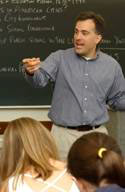
What do Native American boarding schools, 1950s mental hygiene films and the Booker T. Washington/W.E.B. Du Bois debate have in common? They’re all part of the history of American education—and they’re all things Associate Professor Sevan Terzian uses to teach his undergraduate students how our schools became what they are today.
Terzian, known for his innovative approaches to teaching education history, has been named a UF University Teacher of the Year. The honor — given each year to only one or two professors among the University of Florida’s entire faculty — came to Terzian just a few weeks after the College of Education named him its 2008 Undergraduate Teacher of the Year.
“Students unanimously consider Dr. Terzian one of the best teachers they have ever had,” said Professor Tom Dana, director of the School of Teaching and Learning.
Terzian is a researcher in the social foundations of education—a topic that, for many non-teachers, might seem a bit obscure. In his undergraduate courses, however, Terzian uses role-playing, historic films and Socratic dialogue to show students how their own school experiences have been shaped by history, and how teachers have historically tried to shape their students.
Among other activities, Terzian asks his students to play the roles of educator Booker T. Washington and activist/writer W.E.B. Du Bois in a face-to-face version of their famous epistolary debate over African-American education. He has them play the roles of the school officials in a simulated conflict over desegregation and religious instruction in schools. He also plays “mental hygiene” films from the 1950s to show how schools try to control the behavior of their students.
Terzian, a member of the School of Teaching and Learning faculty since 2000, is uniquely well-qualified to teach students about the intersection of popular culture and education history. He holds two doctorate degrees from Indiana University—in the history of education and in American studies—and has devoted much of his research career to the study of the history of the American high school, with a focus on attitudes about science, gender and education in the post-WWII era. He is currently at work on a book about the origins of high school science fairs, science clubs and talent searches from the 1920s to the 1950s.
His colleagues praise his ability to craft a structured, content-rich classroom experience. Students sometimes often describe him as a tough teacher—but also say they would gladly return for another class with him.
“I have not attended a class as difficult as his in my entire college career,” said Whitney Shadowens, a senior majoring in English. “However, the high expectation of learning pushed me to work harder and become a better student.”
In describing his own philosophy of teaching, Terzian stresses the importance of building class community, providing prompt feedback on assignments and encouraging students to ask tough questions.
“Nothing pleases me more than when a student asks a question that makes us all think hard about the nature of our own assumptions,” he said.
